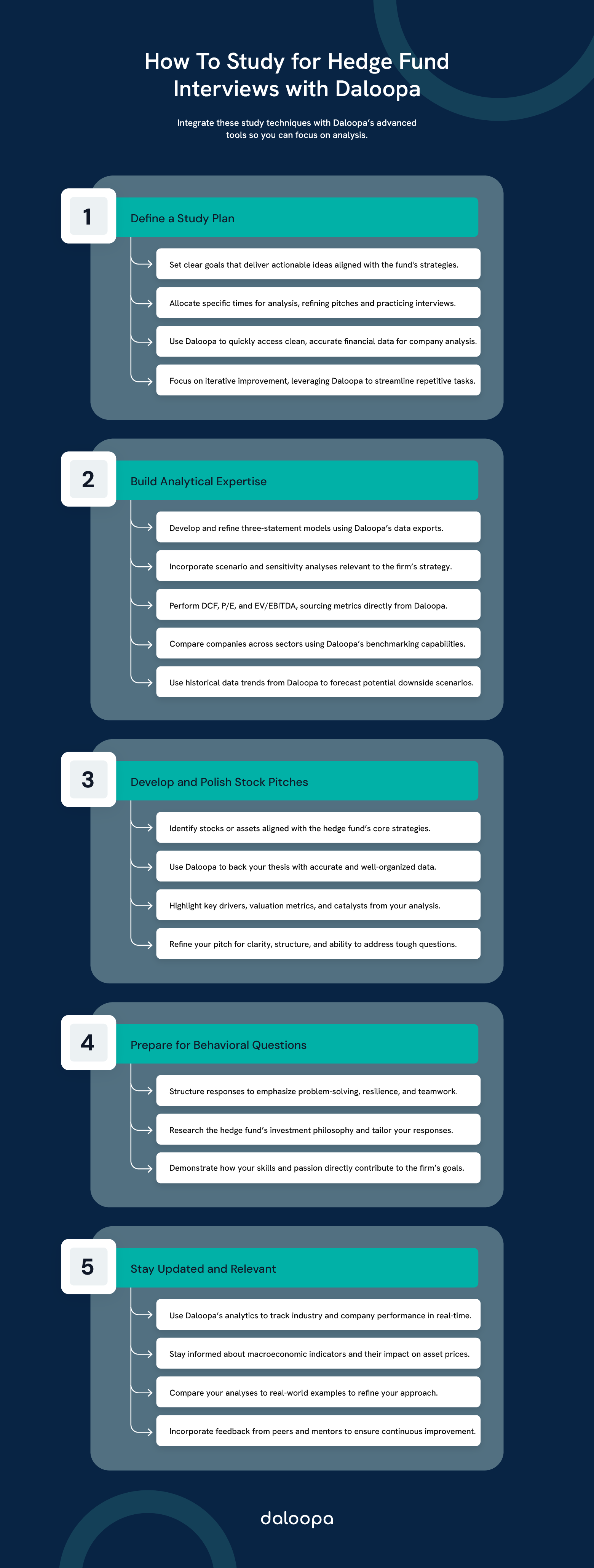Preparing for hedge fund interviews demands a deep understanding of financial markets, exceptional analytical skills, and a genuine passion for investing. These interviews rank among the most challenging in finance, testing your ability to think critically, articulate ideas clearly, and thrive under pressure.
Success in these interviews hinges on mastering the stock pitch, sharpening business intuition, and aligning your investment philosophy with the firm’s strategy. Candidates who excel immerse themselves in the intricacies of the hedge fund industry, demonstrating both technical expertise and the ability to contribute meaningfully to a firm’s success.
Hedge funds prioritize candidates with fresh perspectives, resilience, and a results-driven mindset. Beyond technical acumen, standout candidates effectively communicate their passion and tailor their skills to align with the firm’s vision. In this comprehensive guide on hedge fund interview prep: how to study for hedge fund interviews, we’ll break down the essential skills you need to succeed.

Hedge Fund Interview Essentials
Hedge fund interviews test candidates’ ability to analyze markets, generate actionable investment ideas, and communicate those ideas convincingly. Strategic focus and preparation are critical to succeeding in this high-stakes process.
The Hedge Fund Landscape
With over $3 trillion in global assets under management, hedge funds employ diverse strategies to achieve returns that exceed market benchmarks. Common approaches include:
- Long/Short Equity: Exploiting pricing inefficiencies by buying undervalued stocks and shorting overvalued ones.
- Global Macro: Making informed bets on currencies, commodities, and interest rates based on macroeconomic trends.
- Event-driven: Capitalizing on mergers, acquisitions, or corporate restructurings opportunities.
- Distressed Debt: Investing in financially troubled companies with potential for restructuring and recovery.
Grasping the evolving regulatory landscape, shaped by measures like the Dodd-Frank Act, demonstrates awareness of the industry’s compliance challenges.
Hedge funds operate in a performance-driven environment where analytical rigor, market intuition, and tangible results are paramount.
Crafting a Winning Stock Pitch
The stock pitch allows candidates to showcase their analytical abilities and investment philosophy. A compelling pitch demonstrates your ability to identify value in financial markets and articulate actionable insights.
Building a Persuasive Stock Pitch
A strong stock pitch starts with meticulous research and a structured presentation. Follow these steps:
- Investment Thesis: Clearly explain why the asset is undervalued or overvalued and outline its potential.
- Company Overview: Provide a concise summary of the company’s industry, market position, and competitors.
- Valuation Analysis: Support your argument with key metrics such as P/E ratios, EV/EBITDA, or discounted cash flow (DCF) analysis.
- Risk Factors: Address potential risks and propose strategies for mitigation.
- Catalysts: Identify events or developments likely to drive the stock’s performance.
While financial data lends credibility, factors such as management quality or industry trends add depth to your pitch.
Real-World Stock Pitch Examples
Learning from successful pitches can provide valuable inspiration. For example:
- Bill Ackman’s Chipotle Pitch (2016): Emphasized the brand’s resilience and turnaround potential after operational setbacks.
- David Einhorn’s Allied Capital Short Thesis (2002): Relied on meticulous research to uncover financial mismanagement.
Craft your own pitches on current market opportunities, seek feedback, and iterate.
Enhancing Business Intuition
Business intuition enables hedge fund analysts to evaluate investment opportunities, anticipate risks, and make informed decisions. Developing intuition requires understanding hedge fund strategies and honing your ability to analyze market conditions.
Understanding Hedge Fund Strategies
Familiarity with hedge fund strategies develops actionable ideas. Key approaches include:
- Global Macro: Leveraging economic indicators to make informed investment decisions.
- Market Neutral: Balancing long and short positions to minimize market risks.
- Quantitative Strategies: Utilizing algorithms to identify investment opportunities.
Deepening your knowledge through case studies, fund commentaries, and industry reports equips you to align your insights with a fund’s objectives.
Mastering Market Analysis
Candidates must stay informed on economic indicators, central bank policies, and geopolitical events influencing asset prices. To hone your skills:
- Maintain mock portfolios to track performance and identify trends.
- Conduct scenario analyses to explore how different economic conditions impact portfolios.
- Develop risk management strategies to mitigate losses effectively.
A strong foundation in market analysis demonstrates your readiness to navigate complex financial markets confidently.
Excelling in Technical Hedge Fund Interview Questions
Candidates must demonstrate their ability to build financial models, solve complex problems, and analyze data efficiently. Preparing for hedge fund interviews also involves refining your understanding of valuation methods, financial statements, and key market dynamics to tackle technical questions with confidence.
Developing Excel Expertise
Master tasks such as:
- Building dynamic three-statement financial models.
- Performing scenario analyses and stress-testing assumptions.
- Utilizing advanced functions like INDEX-MATCH, pivot tables, and conditional formatting.
Tackling Common Technical Hedge Fund Interview Questions
Expect questions on valuation methods, financial statement analysis, and accounting principles. These may include:
- Walking through a discounted cash flow (DCF) model and explaining its components.
- Calculating and interpreting financial ratios to assess a company’s performance.
- Explaining how changes in key assumptions impact valuation metrics.
Additionally, familiarize yourself with derivatives, options pricing, and risk management strategies. Proficiency in programming languages like Python or R can provide a significant advantage for quantitative roles.
Aligning with the Firm’s Vision
Hedge funds value candidates who align with their mission, culture, and investment philosophy. Demonstrating this alignment requires thorough research and thoughtful preparation.
Researching the Firm
Start by examining the hedge fund’s history, investment philosophy, and recent performance. Study their portfolio composition to identify patterns in their strategies. Resources like SEC filings, fund rankings, and industry reports can provide valuable insights.
Conversations with current or former employees can help you understand its culture and expectations, enabling you to tailor your responses to align with its goals.
Crafting Behavioral Responses
Behavioral hedge fund interview questions assess your financial acumen, teamwork, and adaptability. Prepare stories that demonstrate:
- Identifying and capitalizing on unique market opportunities.
- Overcoming challenges in high-pressure situations.
- Collaborating effectively to achieve team objectives.
Articulate your commitment to continuous learning and align your goals with the firm’s vision to leave a lasting impression.
Showcasing Expertise and Passion
Hedge funds seek candidates who bring innovative ideas and thrive in high-stakes, team-oriented environments.
Presenting Unique Investment Ideas
Prepare two or three stock pitches that include both long and short positions. Each pitch should be:
- Supported by in-depth research and financial analysis.
- Backed by a clear investment thesis and quantitative insights.
- Thoughtfully aligned with the hedge fund’s strategy.
Demonstrate an understanding of portfolio optimization and risk management to highlight your ability to think strategically and deliver actionable recommendations.
Thriving in Team Environments
Collaboration and adaptability are essential in hedge fund settings. Share examples of how you’ve contributed to team success, particularly in challenging circumstances. Highlight your ability to:
- Communicate complex ideas clearly and effectively.
- Defend your investment thesis under scrutiny.
- Adapt to changing market conditions with agility.
Mastering hedge fund interview prep: how to study for hedge fund interviews requires dedication to both technical expertise and strategic alignment with the firm’s vision. By following the steps outlined in this guide, you’ll be well-equipped to stand out and succeed in one of the most challenging interview processes in finance.
Improve Your Chances with Daloopa
Preparing for hedge fund interviews requires sharp analytical skills and access to accurate and comprehensive data. Daloopa, a cutting-edge financial data platform, can streamline your preparation by automating data collection and providing precise insights for your stock pitches, valuation models, and market analysis.
Daloopa’s advanced tools help you focus on generating actionable investment ideas while saving countless hours on manual data entry. With trusted insights from leading hedge funds, Daloopa empowers candidates to showcase expertise and build confidence for any technical or strategic question.
Start your journey with Daloopa today and prepare like a professional—try a free demo today!



